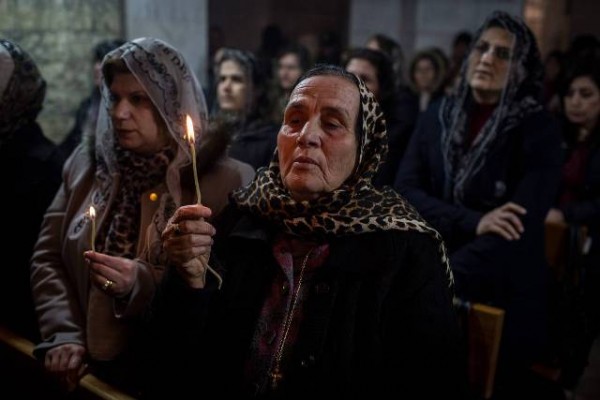
Women prayed at a Christmas mass on Dec. 24 in the Mar Shimoni Church in Bartella, Iraq, which had recently been liberated from Islamic State. Photo: Chris McGrath/Getty Images
ishtartv.com - wsj.com
Yaroslav
Trofimov, Feb. 2, 2017
Few
people are more distraught by President Donald Trump’s executive order barring
citizens of seven Middle Eastern and African countries from the U.S. than the
leaders of a community he said he seeks to help: the region’s Christians.
Mr.
Trump’s order, issued last Friday and aimed at preventing terrorist attacks
on American soil, suspended travel from these Muslim-majority countries for at
least 90 days. It also ordered a revamping of the U.S. refugee admission
process to prioritize those who suffer religious persecution—but only if the
applicants follow a “minority religion” in their country.
Most
of the violence in the Middle East, however, is between Sunni and Shiite
Muslims who both follow the same religion (Sunnis are a minority in Iraq and a
majority in Syria). Speaking to the Christian Broadcasting Network last week,
Mr. Trump said he meant to single out Christians, followers of by far the
largest minority faith in the Middle East.
“They’ve
been treated horribly,” he said. “We are going to help them.”
That
may be good news for a few thousand Middle Eastern Christians aiming to move to
the U.S.—but also a troubling message for the roughly 13 million who won’t.
While White House officials reject depictions of Mr. Trump’s executive order as
a Muslim ban, it has been widely portrayed in the region as consistent with his
campaign rhetoric regarding Muslims entering the U.S.
“Nobody
is seeing this as motivated only by security and everybody views this as
targeting largely Muslim immigration,” said Basem Shabb, the only Protestant
member of Lebanon’s parliament. “Trump’s offer of help is like a poisoned
chalice. It has come at the expense of alienating the region’s Christians from
their Muslim neighbors.”
The
position of Christians in the Middle East varies dramatically. In Lebanon,
where the president and the armed forces commander are both Christians,
they account for a large part of the population and enjoy relative safety. In Egypt,
the region’s biggest Christian community has been targeted by a series of
terrorist attacks but remains a bulwark of support for President Abdel
Fattah Al Sisi. Neither country is covered by the executive order.
Among
the seven countries included in Mr. Trump’s ban, which prohibited entry to
Muslims and Christians alike, Syria and Iraq both have large Christian
communities. Christians there have been persecuted and ousted from their homes
by Islamic State and other Sunni extremist groups. But they were usually
afforded slightly better treatment than Shiite Muslims, who faced a choice
between conversion or death.
Across
the Middle East, a significant part of Muslim public opinion has long viewed
Christian citizens with suspicion because of their historic links with the
West. Mr. Trump’s executive order is likely to inflame these feelings,
warned Michael Wahid Hanna, a specialist on the region at the Century
Foundation think tank in New York.
“It
paints the Christians and other minorities as almost a ward of the West, a
community that doesn’t necessarily have a future in the Arab world,” he said.
That
is one of the reasons why the region’s Christian leaders have denounced Mr.
Trump’s move.
“Christians
are part of the Middle East and they don’t accept being treated separately from
their co-citizens the Muslims,” said Father Rifaat Bader, head of the Catholic
Center for Studies and Media in Jordan.
Iraqi
Christian leaders were particularly irate. In recent months, Iraqi
forces—aided by newly formed Christian militias and by the U.S.—ousted Islamic
State from most of the historic Christian heartland in Nineveh province
around Mosul. Iraqi TV proudly broadcast footage of troops restoring crosses
atop ancient churches.
Those
advances could allow hundreds of thousands of people to return to
Christian-majority towns that remained under extremists’ sway since mid-2014.
Yonadam
Kanna, a Christian lawmaker who heads the minorities bloc in the Iraqi
parliament, said that Mr. Trump’s executive order is likely to backfire on his
country’s Christian community.
“This
will lead to new discrimination. It will reflect very negatively on
minorities,” Mr. Kanna said. “We appreciate the feeling of support for
vulnerable communities, but what we want is to help us to stay, not to
emigrate.”
Babylon
Patriarch Louis Raphael I Sako, the head of the Chaldean Catholic Church in
Iraq, agreed. Mr. Trump’s executive order, he said in a statement to the
Vatican’s Fides news agency, is a “trap for the Christians of the Middle East”
because it “creates and feeds tension with our Muslim compatriots.”
“Discriminating
among those who are persecuted and who suffer based on religion ends up harming
the Christians of the East,” he added. “It provides arguments for all the
propaganda and the prejudices that attack Christian communities.”
|